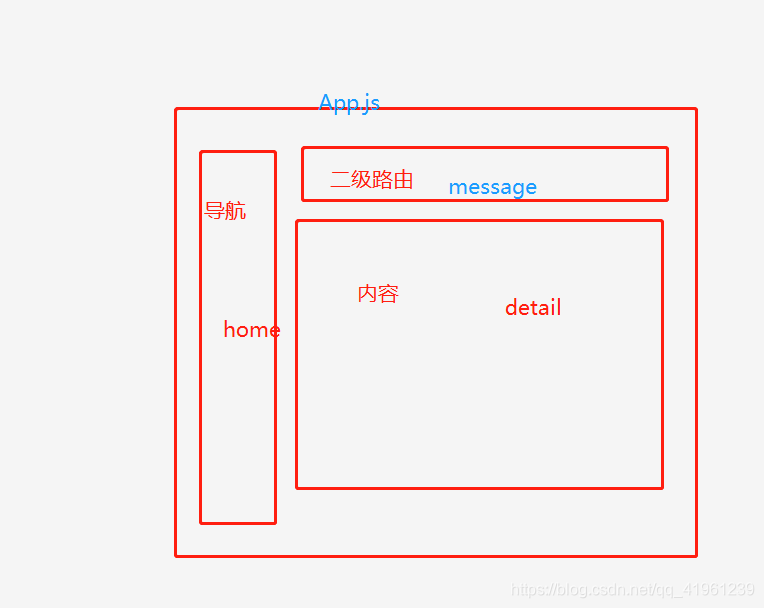react中路由的使用和传递参数问题
下面是使用路由的基本步骤以及总结的知识点,最先面有案例详情
一、路由组件与一般组件
1.写法不同:
一般组件:
2.存放位置不同:
一般组件:components
路由组件:pages
3.接收到的props不同:
一般组件:写组件标签时传递了什么,就能收到什么
路由组件:接收到三个固定的属性
history:
go: ƒ go(n)
goBack: ƒ goBack()
goForward: ƒ goForward()
push: ƒ push(path, state)
replace: ƒ replace(path, state)
location:
pathname: "/about"
search: ""
state: undefined
match:
params: {}
path: "/about"
url: "/about"
二、NavLink与封装NavLink
1.NavLink可以实现路由链接的高亮,通过activeClassName指定样式名
三、Switch的使用
1.通常情况下,path和component是一一对应的关系。
2.Switch可以提高路由匹配效率(单一匹配)。
四、解决多级路径刷新页面样式丢失的问题
1.public/index.html 中 引入样式时不写 ./ 写 / (常用)
2.public/index.html 中 引入样式时不写 ./ 写 %PUBLIC_URL% (常用)
3.使用HashRouter
五、路由的严格匹配与模糊匹配
1.默认使用的是模糊匹配(简单记:【输入的路径】必须包含要【匹配的路径】,且顺序要一致)
2.开启严格匹配:
3.严格匹配不要随便开启,需要再开,有些时候开启会导致无法继续匹配二级路由
六、Redirect的使用
1.一般写在所有路由注册的最下方,当所有路由都无法匹配时,跳转到Redirect指定的路由
2.具体编码:
七、嵌套路由
1.注册子路由时要写上父路由的path值
2.路由的匹配是按照注册路由的顺序进行的
八、向路由组件传递参数
1.params参数
路由链接(携带参数):详情
注册路由(声明接收):
接收参数:this.props.match.params
2.search参数
路由链接(携带参数):详情
注册路由(无需声明,正常注册即可):
接收参数:this.props.location.search
备注:获取到的search是urlencoded编码字符串,需要借助querystring解析
3.state参数
路由链接(携带参数):详情
注册路由(无需声明,正常注册即可):
接收参数:this.props.location.state
备注:刷新也可以保留住参数
九、编程式路由导航
借助this.prosp.history对象上的API对操作路由跳转、前进、后退
-this.prosp.history.push()
-this.prosp.history.replace()
-this.prosp.history.goBack()
-this.prosp.history.goForward()
-this.prosp.history.go()
十、BrowserRouter与HashRouter的区别
1.底层原理不一样:
BrowserRouter使用的是H5的history API,不兼容IE9及以下版本。
HashRouter使用的是URL的哈希值。
2.path表现形式不一样
BrowserRouter的路径中没有#,例如:localhost:3000/demo/test
HashRouter的路径包含#,例如:localhost:3000/#/demo/test
3.刷新后对路由state参数的影响
(1).BrowserRouter没有任何影响,因为state保存在history对象中。
(2).HashRouter刷新后会导致路由state参数的丢失!!!
4.备注:HashRouter可以用于解决一些路径错误相关的问题。
两个界面实现步骤 和具体方案
Message.jsx
import React, { Component } from "react";
import { Link, Route, Switch } from "react-router-dom";
import Detail from "./Detail";
class Message extends Component {
state = {
messageArr: [
{ id: "01", title: "消息1" },
{ id: "02", title: "消息2" },
{ id: "03", title: "消息3" },
],
};
// 链式编程路由导航 三种实现方法
replaceShow = (id, title) => {
// replace跳转+携带params参数
// this.props.history.replace(`/suzhou/home/message/detail/${id}/${title}`);
// replace跳转+携带serach参数
// this.props.history.replace(`/suzhou/home/message/detail?id=${id}&${title}`);
// replace跳转+携带state参数
this.props.history.replace(`/suzhou/home/message/detail`, { id, title });
};
replacePush = (id, title) => {
// this.props.history.push(`/suzhou/home/message/detail/${id}/${title}`);
// this.props.history.push(`/suzhou/home/message/detail?id=${id}&${title}`);
this.props.history.push(`/suzhou/home/message/detail`, { id, title });
};
//-------------结束----------
render() {
return (
<div>
<ul>
{this.state.messageArr.map((mess) => {
return (
<li key={mess.id}>
{/* 向路由组件传递params参数 */}
{/*
{mess.title}
*/}
{/* 向路由组件传递search参数 */}
{/*
{mess.title}
*/}
{/* 向路由组件传递 state参数 */}
<Link
to={{
pathname: "/suzhou/home/message/detail",
state: { id: mess.id, title: mess.title },
}}
>
{mess.title}
</Link>
<input
type="button"
value="push查看"
onClick={() => {
this.replacePush(mess.id, mess.title);
}}
/>
<input
type="button"
value="replace查看"
onClick={() => {
this.replaceShow(mess.id, mess.title);
}}
/>
</li>
);
})}
</ul>
<Switch>
{/* 接收params参数 */}
{/* Deatil.jsx
import React, { Component } from "react";
// 使用search 中 引用的库
import qs from "querystring";
// key=value&key=value urlencoded
const DetailData = [
{ id: "01", content: "你好,中国" },
{ id: "02", content: "你好,宿州" },
{ id: "03", content: "你好,萧县" },
];
class Detail extends Component {
render() {
// 使用params方法获取数据
// const { id, title } = this.props.match.params;
// 使用search参数
// const { search } = this.props.location;
// const { id, title } = qs.parse(search.slice(1));
// state接收参数
const { id, title } = this.props.location.state || {};
const findResult =
DetailData.find((detail) => {
return id === detail.id;
}) || {};
return (
<ul>
<li>ID:{id}</li>
<li>TITLE:{title}</li>
<li>CONTENT:{findResult.content}</li>
</ul>
);
}
}
export default Detail;
MyNavLink.jsx
import React, { Component } from "react";
import { NavLink } from "react-router-dom";
class MyNavLink extends Component {
render() {
return (
<NavLink
activeClassName="suzhou"
className="list-group-item"
{...this.props}
/>
);
}
}
export default MyNavLink;

